Index relies entirely on the support of donors and readers to do its work.
Help us keep amplifying censored voices today.
Physical attacks on journalists have increased dramatically over the past year, according to the latest annual report from the Council of Europe Platform on media freedom in Europe.
The platform, of which Index on Censorship is a partner, reports on serious threats to the safety of journalists and media freedom in Europe in order to reinforce the Council of Europe’s response to the threats and member states’ accountability.
The new report, Defending Press Freedom in Times of Tension and Conflict, reveals that the number of cases involving the safety and physical integrity of journalists has jumped by 51% year-on-year, with 82 cases reported to the platform.
Many of the attacks on journalists have taken place during public protests.
“Violence against journalists during street protests is fed by a wave of media bashing and an avalanche of hate speech on social networks – very often prompted by political figures – which directly target journalists, questioning their independence and legitimacy and therefore making them more vulnerable to physical aggression,” the report says.
Overall, the number of alerts in all categories published by the CoE platform has sky-rocketed to 280 in 2021, up from around 200 in 2020 and more than double the level reported in 2016. Of the 280 alerts, 110 related to the harassment and intimidation of journalists.
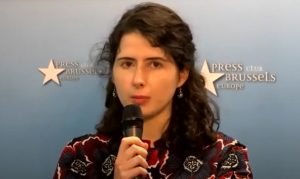
Index’s policy and campaigns manager Jessica Ní Mhainín
Speaking at the launch of the report, Index’s policy and campaigns manager Jessica Ní Mhainín highlighted cases of impunity in CoE’s report.
“Impunity for crimes against journalists refer to failure of states to identify, prosecute and punish anyone including the assailants and masterminds involved in committing a crime against a journalist,” she said. “Cultures of impunity contribute to self-censorship by making journalists more vulnerable to pressures out of fear of reprisals or harm.”
Some 35 cases of impunity have been registered on the platform since 2015 and two new impunity cases – those of Turkish journalist Uğur Mumcu, murdered in 1993, and Turkish-Cypriot journalist Kutlu Adalı, murdered in Cyprus in 1996 – were added to the impunity category during the year.
“In 2021, we welcomed the Slovak Supreme Court’s decision to overturn the not-guilty verdicts of the suspected masterminds of the 2018 murder of journalist Ján Kuciak and his fiancée Martina Kušnírová. The case will be heard in the Specialized Criminal Court later this year,” said Ní Mhainín.
Last year also saw the publication of a 438 page-report from the public inquiry into the assassination of investigative journalist Daphne Caruana Galizia, which concluded that the state of Malta “must bear responsibility for the assassination because it created an atmosphere of impunity”.
“We once again call on the Maltese authorities and the Commission of Experts to implement the recommendations of the Public Inquiry,” said Ní Mhainín.
Russia, Turkey and Ukraine account for 60% of all the cases relating to impunity on the platform. Last October marked the 15th anniversary of Russian journalist Anna Politkovskaya’s murder.
Ní Mhainín said, “The masterminds of her murder are still at large, sending the incredibly dangerous message that killing a journalist is a low-risk crime.”
Yet impunity is not restricted to these countries.
A BBC Spotlight investigation has uncovered serious concerns over the police investigation and the failure to prosecute those behind the murder of Irish journalist Martin O’Hagan, who was killed in September 2001 for his reporting on paramilitary activities in Northern Ireland. The concerns raised in the programme, which aired on 2 March 2022, came in the wake of several Police Ombudsman reports that uncovered collusive behaviour between the police and loyalists in Northern Ireland. According to the BBC’s investigation, police did not act on important information – including individual names – that were handed over to them within 48 hours of the murder. The journalist’s family are now taking legal action against the Police Service of Northern Ireland (PSNI) and the Ministry of Defence.
“Press freedom is the canary in the coal mine – it is a key indicator of the clear and worrying degree of democratic backsliding that is taking place across Europe,” said Ní Mhainín. “That’s why we once again call on Council of Europe member states to ensure that the highest priority is given to conducting thorough and transparent investigations into all crimes against journalists and we remind member states of the 2016 Recommendation of the Committee of Ministers which requires states ‘adopt appropriate criminal law provisions to prevent impunity’”
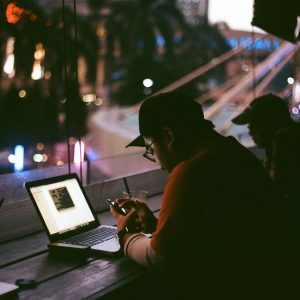
Photo by Muhammad Raufan Yusup on Unsplash
I regularly start my weekly blog with the exclamation “there is just too much news!” Too much horror and heartbreak and this week the assertion is all too true.
Russia has invaded a sovereign country and daily we are seeing evidence of war crimes on the continent of Europe; China is arresting yet more democracy activists on the flimsiest of excuses; there have been bombings targeting schools in Afghanistan; a neo-fascist is, yet again, in the final run-off in the French Presidential elections; there are riots in Sweden against the far-right with dozens hurt; people are starving in Shanghai under Covid-19 restrictions; there is active conflict again in Jerusalem, with over 150 Palestinians hurt in clashes after a series of terror attacks targeting Israelis in recent weeks; another video of a black man being fatally shot by the police has emerged in the US – Patrick Lyoya was killed, while being held on the ground, defenceless, on 14 April and riots have followed in Michigan.
Our team at Index is working on every one of these news stories. We work with people on the ground, and we commission dissidents and writers, in country, to give us a first-hand account. In the twenty-first century we can speak to people in every corner of the globe, as events are happening, because of the internet and the social media platforms which afford us all a level of protection because of end-to-end encryption. We work with people on the ground who would be arrested, tortured, or even killed because they want to share their experiences with the world. They want the world to know what is happening to them and to their communities. They are on the frontline in the perpetual fight for our democratic right to freedom of expression. They are vulnerable because of who they are and what they want to share with us, whether that’s their writings, their opinions or their art.
They are brave and inspirational and determined to stand up for what is right. For as long as they want to tell their stories there is a moral onus for us to listen to them.
Which brings me to the current proposals to regulate our online lives currently being progressed in the European Union and in the United Kingdom. In Europe, today (Friday) the final negotiations on the substance of the Digital Services Act are underway and, in the UK, the Online Safety Bill began its parliamentary journey on Tuesday. Index is working actively with partners to try and mitigate the worst aspects of both pieces of legislation and we were in Brussels this week to make the case for additional protections for freedom of speech. Our overriding goal is to make sure that our access to those brave dissidents is protected and that our rights to discuss the detail of these horrors are protected. To make sure that while legislators are trying to ‘protect’ us online they don’t end up inadvertently silencing us.
Index advocates for free expression within the protections afforded to us by the European Convention on Human Rights. There is no right not be offended. There is no right not to see things online, or in real life, that will upset you. Of course, we all want to protect each other from seeing the worst aspects of human life – that’s an admirable aspiration but it isn’t the grounds for making new law. In fact, it’s the exact opposite – legally we have protected freedom of expression, it’s a fundamental right. I have written before about our concerns regarding online regulation and in the coming months I’ll be writing extensively on it – but we start with the basic principle – what is legal to say should be legal to type. And that should be the case whatever any new legislation seeks to amend.
Kateryna Yegorushkina is a Ukrainian children’s writer and publisher from a town close to Kyiv. Here, in our second video on the state of free expression in Ukraine, Kateryna speaks of her own situation as a writer and mother. She also draws parallels with the Second World War: as she prepared to flee the Russian invasion, Kateryna packed letters sent to her grandmother from her sweetheart who died at the front. The author also describes how the conflict has made her stop writing a planned book about “cute animals and their friendships” and switch instead to a children’s book about the war.
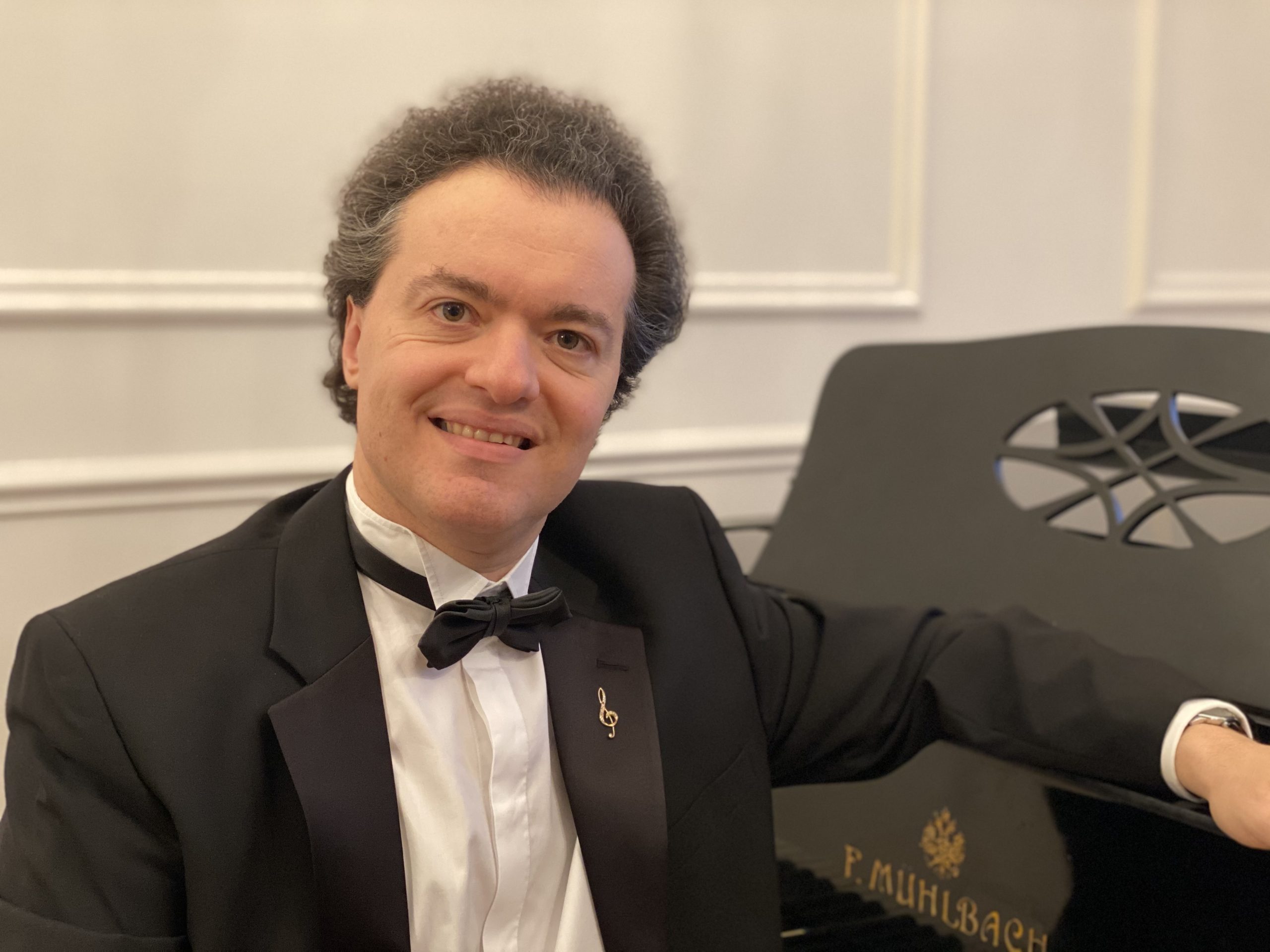
Evgeny Kissin, one of the most famous pianists in Russia, has described Vladimir Putin as a “bloodthirsty criminal”. Photo: Wikimedia Commons/Gkobe
The world in which Index on Censorship was born seems to be reemerging. In August 1968, after the blossoming of freedoms in Czechoslovakia known collectively as the Prague Spring, the Soviet Union invaded the country. Protesters were brutally crushed. Despite the violence and the stranglehold on freedoms back in Russia, eight fearless dissidents took to Red Square in Moscow to demonstrate.
One of the bold demonstrators was Pavel Litvinov, a young physicist at the time. In that same year Litvinov had co-authored a pamphlet entitled Appeal to World Public Opinion, asking those in the west to fight against the suppression of dissent in the Soviet Union. The poet Stephen Spender responded, suggesting the creation of an international committee whose goal would be to support the democratic movement in the USSR. This committee would engage writers, scholars, artists and public personalities from countries like the UK, the USA and also Latin American nations.
This is how Index on Censorship was brought into life, responding to the call of these dissidents and giving them a voice.
More than 50 years later, the USSR doesn’t exist anymore, but Russia has shocked the world with the invasion and consequential brutal war in Ukraine. What remains is the courage and bravery of people and dissidents defying the regime of Vladimir Putin. Below are just six of the noticeable Russian citizens who’ve spoken up against Putin and the war in Ukraine.
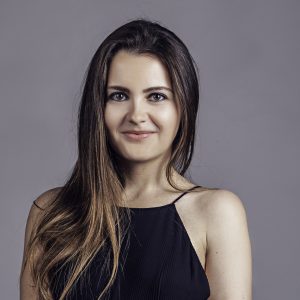
Russian artist Victoria Marchenkova, who’s been using Facebook to encourage people in Ukraine to flee to Canada. Photo: Wikimedia Commons/Na4ya
“STOP THE WAR” – that’s what the Moscow-born artist Victoria Marchenkova wrote on her website. Marchenkova works with different styles, but with one thing in mind: approaching the economic situation of the world, international traditions and its heritage. After the war in Ukraine began, she announced on her website that her solo exhibition at a Moscow gallery had been delayed until the end of the Russian invasion. Her exact words? “Please let’s save the world all together. STOP THE WAR”. Very active on Facebook, she has also encouraged people in Ukraine to flee to Canada.[/vc_column_text][vc_custom_heading text=”2. Evgeny Kissin – pianist”][vc_column_text]The pianist Evgeny Kissin has been an important name from Russia who declared himself against the war. In a solemn video titled Note of Protest, Kissin called Russia’s invasion of Ukraine a crime that has no excuse and also described Vladimir Putin as a bloodthirsty criminal. “Sadly, far from all who initiate criminal wars are punished, but none escape the judgment of history,” Kissin said. The video was published on his Instagram account and was viewed around 100,000 times.[/vc_column_text][vc_custom_heading text=”3. Mikhail Gelfand – biologist”][vc_column_text]Renowned Russian biologist Mikhail Gelfand is considered one of the most important people in the area of molecular evolution, comparative genomics and systems biology. He was the main person behind a letter signed by approximately 7,000 Russian scientists against the war in Ukraine. It’s a bold move. The Russian president has said that every Russian citizen who questions his invasion of Ukraine will be treated as a traitor and that a necessary self-purification of society will help to strengthen the country.[/vc_column_text][vc_custom_heading text=”4. Marina Ovsyannikova – journalist”][vc_column_text]
Daughter to a Russian mother and an Ukrainian father, Marina Ovsyannikova is a Russian journalist who had a job on the Channel One Russia TV channel. She gained prominence after she broke into a state-controlled Russian TV news broadcast and protested against the war. As a result, she was arrested and fined, but was released afterwards. Today, while she waits trial for interrupting the news programme, she is very active on her Instagram account. If convicted, she could be sentenced to 15 years in prison. In a recent post on Instagram, she wrote: “I wanted to demonstrate to the world that not all Russian people believe the same and I believe that many people… are against the war.”
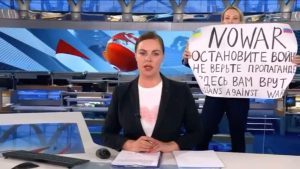
This video grab shows Russian Channel One editor Marina Ovsyannikova holding a poster reading ” Stop the war. Don’t believe the propaganda. Here they are lying to you” during on-air TV studio by news anchor Yekaterina Andreyeva, Russia’s most-watched evening news broadcast. Photo: Zuma Press/Alamy
[/vc_column_text][vc_custom_heading text=”5. Ilya Varlamov – blogger”][vc_column_text]The Russian Youtuber from Moscow has been speaking openly about the war in Ukraine on his Youtube channel, which is focused on analysing politics in Russia. Often critical in tone he has interviewed people such as Alexei Venediktov, the former editor-in-chief of the now-closed Ekho Moskvy. He has more than 3.3 million subscribers, where he’s been publishing videos almost daily. At the time of print, Varlamov had not been detained for his criticisms. He does have some experience of this though; he was briefly arrested in South Sudan after security found the remote control of a drone in his luggage, accusing him of trying to film military activities with the drone.
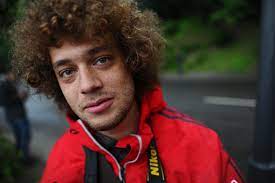
Russian Youtuber Ilya Varlamov. Photo: Wikimedia Commons/Mitya Aleshkovskiy
[/vc_column_text][vc_custom_heading text=”6. Youri Doud – blogger”][vc_column_text]Born in East Germany in 1986, Youri Doud sees himself as Russian by identity. He’s worked as a freelance journalist and in 2017 he launched a Youtube channel with the purpose of interviewing Russian celebrities. After Russia began its so called “mission” in Ukraine, Doud shared on his Instagram account a song called 100-year War, written by the group Noize MC, which has achieved millions of likes and reactions. The song discusses what artists should do when it’s not within their power to change a political catastrophe which is developing. The conclusion of the band is short and clear: “We have no other choice than to honestly speak up about what is happening. So that’s what we are doing.